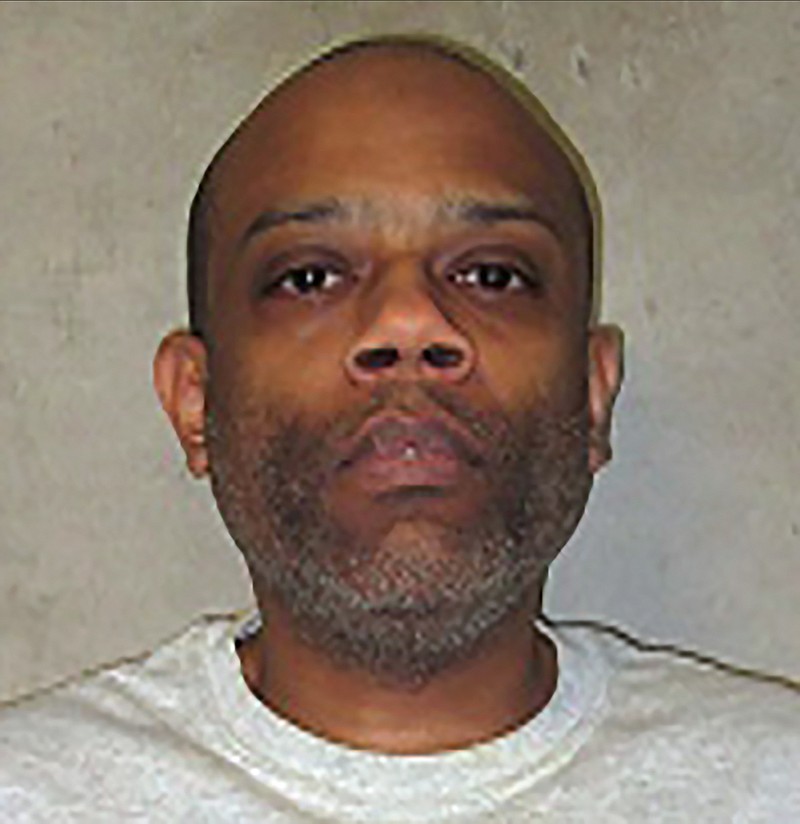Oklahoma executed a man Thursday for the slayings of two hotel workers during a robbery in 2001 and, on the same day, Alabama executed an inmate by lethal injection for a 1996 murder after a divided U.S. Supreme Court sided with the state and rejected defense claims the man had an intellectual disability that cost him a chance to choose a less "torturous," yet untried execution method.
Donald Grant, 46, received a lethal injection at the Oklahoma State Penitentiary in McAlester and was declared dead at 10:16 a.m. It was the first execution in the U.S. in 2022 and the third in Oklahoma since the state resumed lethal injections in October after a nearly seven-year hiatus.
"Yo, God, I got this," Grant said while lying strapped to the gurney, delivering his disjointed last words for two minutes. "No medication. I didn't take nothing. Brooklyn for life."
Shirl Pilcher, the sister of one of Grant's victims, Brenda McElyea, said her family felt that justice had been served.
"Although Donald Grant's execution does not bring Brenda back, it allows us all to finally move forward knowing justice was served," Pilcher said after witnessing his execution.
Grant had asked a federal judge to temporarily halt his execution, arguing that he should be reinstated as a plaintiff in a separate lawsuit challenging Oklahoma's three-drug lethal injection protocol as presenting a risk of unconstitutional pain and suffering. But both a federal judge and a three-judge panel of the 10th U.S. Circuit Court of Appeals in Denver previously denied that request.
The U.S. Supreme Court denied Grant's request on Wednesday.
Several Oklahoma death row inmates with pending execution dates have sought to delay their executions after John Grant convulsed on the gurney and threw up after receiving the first dose of midazolam, a sedative, during his October execution.
John Grant's execution was the state's first since problems with the state's lethal injection protocols in 2014 and 2015 led to an unofficial moratorium.
During a clemency hearing in November, Donald Grant admitted killing McElyea and Felicia Smith so that there would be no witnesses to his robbery of the Del City hotel.
During November's hearing, he expressed "deep, sincere remorse" and apologized for the killings, but the state's Pardon and Parole Board voted 4-1 against recommending clemency.
"I can't change that," he said of the crime while speaking to the board. "If I could, I would, but I can't change that."
In Alabama, Matthew Reeves, 43, was put to death at Holman Prison after the court lifted a lower court order that had prevented corrections workers from executing the prisoner. He was pronounced dead at 9:24 p.m., state Attorney General Steve Marshall said in a statement.
Reeves was convicted of capital murder for the killing of Willie Johnson, who died from a shotgun blast in his neck during a robbery in Selma on Nov. 27, 1996, after picking up Reeves and others on the side of a rural highway.
While courts have upheld Reeves' conviction, the last-minute fight by his lawyers seeking to stop the execution involved his intellect, his rights under federal disability law and how the state planned to kill him.
The Supreme Court on Thursday evening tossed out a decision by the 11th U.S. Circuit Court of Appeals, which had ruled Wednesday that a district judge didn't abuse his discretion in ruling that the state couldn't execute Reeves by any method other than nitrogen hypoxia, which has never been used.
In 2018, Alabama death row inmates had a chance to sign a form choosing either lethal injection or nitrogen hypoxia as an execution method after legislators approved the use of nitrogen. But Reeves was among the inmates who didn't fill out the form stating a preference.
Suing under the American With Disabilities Act, Reeves claimed he had intellectual disabilities that prevented him from understanding the form offering him the chance to choose nitrogen hypoxia -- a method never used in the U.S. -- over lethal injection, which the inmate's lawyers called "torturous."
Reeves also claimed the state failed to help him understand the form. But the state argued he wasn't so disabled that he couldn't understand the choice.
It was a divided court that let the execution proceed. Justice Amy Coney Barrett said she would deny the state's request, and Justice Stephen Breyer and Justice Sonia Sotomayor joined with Justice Elena Kagan in a dissent that said the execution shouldn't occur.
An Alabama inmate who was put to death by lethal injection last year, Willie B. Smith, unsuccessfully raised claims about being intellectually unable to make the choice for nitrogen hypoxia.
Information for this article was contributed by Sean Murphy and Jay Reeves of The Associated Press.

